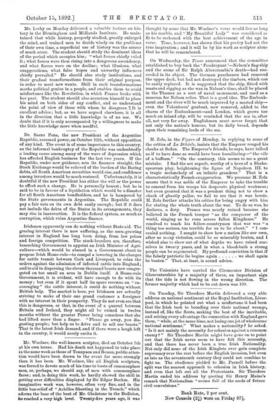M. Zola, in the Figaro of Monday, in replying to
some of the critics of La Debacle, insists that the Emperor rouged his cheeks at Sedan. The Emperor's friends, he says, have talked as if to have done so would have been humiliating—" the rule of a buffoon." " On the contrary, this seems to me a great mistake. I find the act superb, worthy of a hero of a Shake- spearean play, heightening the figure of Napoleon III. to a tragic melancholy of an infinite grandeur." That is a characteristically French exaggeration. We presume M. Zola means that it was noble of the Emperor to take the trouble to conceal from his troops his desperate physical weakness ; but even granted that it was a prudent thing not to show a cheek of ghastly pallor, we fail to see that it was heroic. M. Zola further attacks his critics for being angry with him for stating the whole truth about the war. To do so was, he declares, a duty. France was nearly ruined because she believed in the French trooper " as the conqueror of the world, singing as he runs across fallen Kingdoms." He resolved to teach his fellow-countrymen that war was " a thing too serious, too terrible for us to lie about." " I con- cealed nothing. I sought to Elbow how a nation like our own, after so many victories, could be so miserably beaten, and I wished also to show out of what depths we have raised our- selves in twenty years, and in what a blood-bath a strong people can be regenerated. My profound conviction is that if the falsely patriotic lie begins again we shall again be beaten." That, at least, is sound advice.


































 Previous page
Previous page